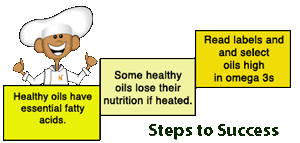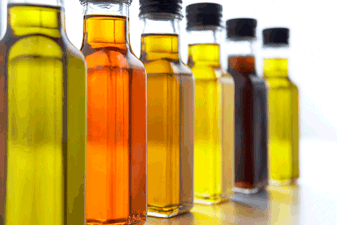 Not all oils are created equal- while the fatty acids that oils provide can be an important part of a healthy diet, there are oils that can contribute to free radical damage in the body, among other things. Learning to navigate between the dozens of different oils available at the supermarket is a useful skill that can ultimately make the difference between health and illness.
Not all oils are created equal- while the fatty acids that oils provide can be an important part of a healthy diet, there are oils that can contribute to free radical damage in the body, among other things. Learning to navigate between the dozens of different oils available at the supermarket is a useful skill that can ultimately make the difference between health and illness.
The fatty acid profile of an oil determines whether it will be healthy when used in cooking or baking. Generally, the more saturated fat and monounsaturated fat an oil contains, the more stable it will be during high-heat cooking. In addition, it needs to be lower in polyunsaturated fatty acids, because these are highly unstable and tend to oxidize easily when exposed to heat, which you will notice happening when the oil starts to smoke. This oxidation is linked to inflammation in the body and many illnesses. Coconut oil, which in addition to its ideal fatty acid profile and excellent stability has natural antimicrobial and antiviral properties, is thus the healthiest oil for cooking. Other contenders are avocado and extra virgin olive oil, although they cannot handle heat like coconut oil, and need to be stored in a cool, dark place to protect them from going rancid. Combining them with butter or coconut oil during cooking will help their stability, but they are wonderful for colder dishes.
 Another property to look for when selecting a healthy oil is its omega-6 to omega-3 fatty acid ratio for heart health. In general, we need to consume fats that have a higher composition of omega-3 fatty acids, which is why eating fish is so beneficial. Unhealthier oils have a higher composition of omega-6 fatty acids and can contribute to many illnesses if consumed frequently. Walnut oil, macadamia oil, and flax oil all have high omega-6 profiles and although have natural benefits, should be consumed in moderation.
Another property to look for when selecting a healthy oil is its omega-6 to omega-3 fatty acid ratio for heart health. In general, we need to consume fats that have a higher composition of omega-3 fatty acids, which is why eating fish is so beneficial. Unhealthier oils have a higher composition of omega-6 fatty acids and can contribute to many illnesses if consumed frequently. Walnut oil, macadamia oil, and flax oil all have high omega-6 profiles and although have natural benefits, should be consumed in moderation.
Finally, the manner in which an oil is extracted contributes to its overall health. For this reason, make sure to always look for oils that are unrefined and minimally processed. The terms “cold-pressed” or “expeller-pressed” will be displayed prominently on the nutrition label. In the absence of these terms, you can assume that oil was extracted using unnatural and often harmful chemical means. A prime example of an oil that is widely used but unfortunately dangerous in this department is canola oil. Canola oil is extracted from the inedible and often genetically modified rapeseed and very heavily and extensively processed with heat and toxic chemicals to produce an edible and stable product. In general, all industrial vegetable oils should be avoided as much as possible (corn, soybean, cottonseed, grape seed, sunflower, sesame, etc.) because of their extraction methods, along with being higher in omega-6 fatty acids. In addition, a lot of them contain trans fats which are now well-established as dangerous.
Unfortunately, it can be difficult to avoid the unhealthier oils, especially when eating out or purchasing products such as salad dressings which are oil-based. Be sure to check labels on grocery store items and stock your pantry with stable and natural oils that will keep you and your family healthy.

0 Comments